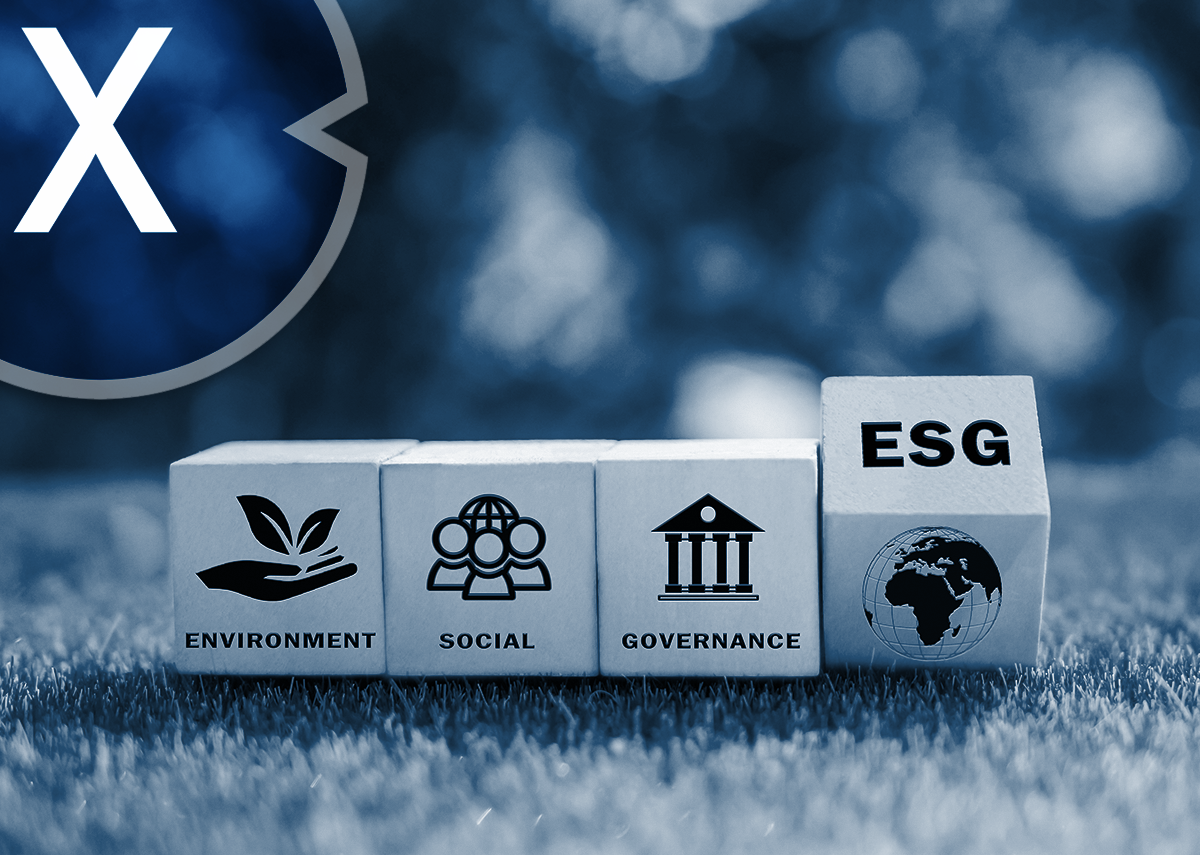What is ESG (Environmental, Social and Governance), where does it come from, who introduced it and why?
Language selection 📢
Published on: November 30, 2023 / Update from: November 30, 2023 - Author: Konrad Wolfenstein

What is ESG (Environmental, Social and Governance), where does it come from, who introduced it and why? – Image: Xpert.Digital
🌏🌿🧑💼 ESG – Environmental, Social and Corporate Governance
ESG stands for “Environmental, Social, and Governance”, which means “environment, social affairs and corporate management”. These are criteria for the assessment of sustainability and ethical effects of a company or business.
🌱 Environmental aspect (E)
The environmental aspect (E) of ESG refers to how a company meets its responsibilities towards the environment. This includes the use of natural resources, the reduction of emissions, waste management and the development of sustainability strategies.
🤝 Social aspect (S)
The social aspect (S) looks at how a company manages its relationships with employees, suppliers, customers and the communities in which it operates. This is about labor rights, health and safety in the workplace and the impact on the local community and society.
⚖️ Governance aspect (G)
The governance aspect (G) refers to corporate management, i.e. how a company is managed and controlled. This covers topics such as corporate ethics, conflicts of interest, the composition and functioning of the board of directors and the accountability of the company.
🚀 Advantages of dealing with ESG criteria
Addressing ESG criteria is beneficial for companies for several reasons. First, it can improve risk management because companies that take ESG factors into account can better identify and respond to potential risks such as environmental disasters or social unrest. In addition, such practices can lead to an improvement in brand image and reputation, which can have a positive impact on customer relationships and sales.
Another advantage is access to new markets and sources of capital. Investors are increasingly interested in sustainable investments, and a good ESG rating can increase the attractiveness of a company for these investor groups. This can also lead to better conditions when raising capital, as some lenders offer lower interest rates for projects with high ESG value.
📈 Implementation of an ESG strategy
To implement an ESG strategy, it is important that companies develop clear policies and concrete goals. They should evaluate their current practices and identify areas for improvement. This also includes training employees on ESG issues and involving all stakeholders in the sustainability process.
📊 Measuring and reporting on ESG performance
Measuring and reporting on ESG performance is also critical. Companies should report transparently on their progress and seek independent audits of their ESG reports to increase stakeholder credibility and trust.
🔄 Continuous improvement
Finally, continuous improvement is a key aspect. Companies should regularly review and adjust their ESG objectives to ensure they remain relevant and are making progress.
✨ ESG as a holistic approach
ESG is a holistic approach that helps companies be successful and sustainable in the long term. Not only does it provide an opportunity to minimize risks and improve corporate image, but it also promotes innovation and can contribute to positive change in society.
📣 Similar topics
- 🌿 ESG criteria and their importance for companies
- 🌟 From risk management to a positive image: The advantages of ESG
- 🏢 Sustainable corporate management through ESG strategies
- 🛠️ The importance of Environmental, Social & Governance in a business context
- 🌱 ESG: A guide for responsible companies
- 🔄 Continuous improvement and ESG: Why it matters
- 💼 How ESG strengthens the brand image of companies
- 💡 ESG Ratings: A Key to Investing and Capital Gains
- 🔍 Transparency and reporting: The role of ESG performance
- ✅ Development and implementation of an effective ESG policy
#️⃣ Hashtags: #ESG #Sustainability #Corporate Governance #RiskManagement #StakeholderEngagement
🌱🏦 Sustainability Communication - sustainability communication for companies - corporate PR, marketing, communication & consulting
Sustainability Communication refers to the communication of information, strategies, goals and measures that are related to sustainability. The aim is to create and promote a better understanding and awareness of sustainable practices and concepts. This form of communication can take place at different levels, for example within organizations, between companies and their stakeholders or in the general public.
More about it here:
🌱🏦 The origins of the ESG concept 🌱🏦
📜 Historical roots of ESG
The origins of the ESG concept can be traced back far into the past, with the beginnings of investing according to ethical principles dating back centuries. Historically, the roots of modern ESG investing can be traced to religious codes that prohibited investments in slave labor. Specifically, in the 18th century, religious groups such as the Quakers and Methodists in the United States made value-based investment decisions that could be similar to ESG criteria today.
✊ Start of socially responsible investing
However, the practice of ESG investing as we know it today began in the 1960s with so-called socially responsible investing. Investors excluded stocks or entire industries from their portfolios based on business activities such as tobacco production or involvement in the apartheid regime in South Africa. In the 1960s and 1970s, there were increasing calls for disinvestment from South Africa as a protest against the apartheid system there.
📈 The modern world of ESG investing
These historical decisions were driven by moral norms, cultural values and often religious beliefs. However, the modern form of ESG investing, which explicitly takes these social, environmental and governance factors into account, emerged primarily in the 1970s. At this time, organizations and investors began to incorporate criteria beyond pure financial returns into their investment decisions.
🌐 ESG in business
The introduction of the ESG concept was driven by the increasing awareness of the importance of sustainability and corporate social responsibility. Investors and consumers alike began to judge companies based on their performance in these areas. This led to companies beginning to integrate ESG principles into their operating strategies and reporting to demonstrate their commitments to the environment, society and their governance structures.
🔄 The development of ESG
The shift towards ESG also reflected a shift in the recognition that long-term economic success depends not only on financial returns, but also on a company's ability to maintain positive relationships with the environment, with society and within its own governance. This is how ESG has evolved from a niche concept to a mainstay of modern business and investment practices. Today it forms an important basis for evaluating companies and is a decisive criterion for many investors when deciding where they want to invest their money.
📣 Similar topics
- 🌱 The historical roots of ESG investing
- 🙏 Ethics and Investment: A Trace of the Past
- 🚫 Quakers and Methodists: Pioneers of Value-Based Investing
- 💼 The rise of socially responsible investing
- ✊ Protests and Disinvestment: The Apartheid Era
- 🏭 The development of modern ESG criteria in the 70s
- 🌐 From moral norms to global ESG standards
- 🏢 Integrating ESG into business strategies
- 💡 ESG: A revolution in company valuation
- 📈 ESG investing: From niche concept to mainstream
#️⃣ Hashtags: #ESGInvesting #Sustainability #SocialResponsibility #CorporateGovernance #ValueBasedInvesting
🌿🌟 ESG Practices: The New Era of Business Conduct 🌟🌿
🌱 Environmental aspect of ESG
Environmental, social and corporate governance practices, summarized under the acronym ESG (Environmental, Social, and Governance), have assumed a fundamental role in the global business environment in recent decades. The roots of ESG can be traced to various social and environmental movements that developed throughout the 20th century.
🤝 Social aspects
The environmental aspect of ESG focuses on addressing environmental challenges such as climate change, biodiversity loss, deforestation and water scarcity. Social aspects relate to human rights, occupational safety and the common good. Corporate management or governance looks at the management structures within companies, including management practices, compensation, corruption and transparency.
🌐 Beginnings of ESG
However, the targeted bundling of these interests under the term ESG only took place at the beginning of the 21st century. In 2004, the United Nations Environment Program Finance Initiative (UNEP FI) released a report entitled "Who Cares Wins" that called on investors to incorporate environmental, social and governance factors into their decision-making.
💼 Governance in focus
In 2006, the United Nations launched the Principles for Responsible Investment (PRI) initiative, marking another important milestone for the ESG movement. These principles provide a framework for sustainable investing that takes into account environmental, social and governance factors.
📈 ESG and investments
ESG factors are now used by investors to assess companies' long-term risks and opportunities that go beyond traditional financial criteria. The demand for sustainable investments has risen sharply in recent years, driven by the growing awareness of social and ecological problems, but also by the realization that sustainable business also makes economic sense in the long term.
🌍 Urgency of the environmental component
The environmental component of ESG has intensified with the urgency of climate change and its consequences. The need to reduce greenhouse gas emissions and transition to a low-carbon economy has led companies to take greater account of their environmental impact. This includes measures such as reducing emissions, using renewable energy sources, improving resource efficiency and implementing circular economy concepts.
🧑🤝🧑 Social aspects of ESG
On a social level, ESG criteria address how companies treat employees, suppliers, customers and the general public. Issues such as diversity and inclusion, working conditions, human rights and community engagement are becoming increasingly important.
✅ Governance practices
In terms of governance, the focus is on transparent management, ethical business practices, effective board structures and the avoidance of conflicts of interest. These aspects are essential for strengthening the trust of stakeholders and investors. Good corporate governance can lead to improved decision-making processes and has the potential to prevent corporate scandals and fraud.
🤝 ESG as a competitive factor
The integration of ESG has become an important competitive factor. Companies that meet high ESG standards are often able to raise capital more easily because they are perceived as less risky. They can also benefit from greater customer loyalty and improved employee retention.
💹💰 ESG's influence on company valuations
ESG also has a significant impact on company valuation. There is evidence that companies with strong ESG performance often achieve better financial results and receive higher market valuations. Investors and analysts are increasingly recognizing that companies that perform well on ESG are often better prepared for future challenges.
📊 Disclosure and ESG reporting
Disclosure and reporting around ESG are becoming increasingly important. Different regulations and standards apply in different countries and regions. For example, the European Union is a leader in developing ESG reporting standards and expects companies to disclose their ESG risks and practices as part of their annual reports.
🌐📏 Efforts to standardize ESG criteria
However, the challenge remains to standardize and objectify ESG criteria. Many organizations, such as the Sustainable Accounting Standards Board (SASB), the Global Reporting Initiative (GRI), and the International Integrated Reporting Council (IIRC), are working to develop frameworks to create comparability and consistency in ESG reporting.
🔮✨ Outlook on the future of ESG
Looking ahead, ESG is expected to continue to grow in importance. Ongoing global challenges – be it climate change, social inequality or the need for responsible corporate governance – underline the importance of ESG in risk management and investment decisions. It is a constant process that is of central importance not only for companies, but also for society and the environment.
📣 Similar topics
- 🌱 ESG as a guide for sustainable business
- 🌍 Climate change challenges from an ESG perspective
- 🤝 ESG and social responsibility in modern corporate management
- 💼 Corporate governance as a cornerstone of ESG
- 📈 Promote sustainable investments through ESG criteria
- 🔋 The role of renewable energy in ESG strategies
- 🌟 Diversity and inclusion as a social dimension of ESG
- 📘 Standardization and reporting in the ESG landscape
- 💡 ESG: Key indicator for risk management and investment decisions
- 🔍 Transparency and ethical business practices through ESG governance
#️⃣ Hashtags: #ESG #Sustainability #Climate Change #CorporateGovernance #SocialResponsibility
Plan your solar system for the most common applications conveniently online with our solar system planner!
With our user-friendly solar system planner you can plan your individual solar system online. Whether you need a solar system for your home, your business or for agricultural purposes, our planner offers you the opportunity to take your specific requirements into account and develop a tailor-made solution.
The planning process is simple and intuitive. You simply enter relevant information. Our planner takes this information into account and creates a tailor-made solar system that meets your needs. You can try out different options and configurations to find the optimal solar system for your application.
Additionally, you can save your plan to review later or share with others. Our customer service team is also available to answer your questions and provide support to ensure your solar system is optimally planned.
Use our solar system planner to plan your individual solar system for the most common applications and advance the transition to clean energy. Start now and take an important step towards sustainability and energy independence!

The solar system planner for the most common applications: Plan the solar system online here - Image: Xpert.Digital
More about it here:
We are there for you - advice - planning - implementation - project management
☑️ Expert advice on energy-efficient renovation and new construction
☑️ with solar solutions and heat pumps/air conditioning systems
I would be happy to serve as your personal advisor.
You can contact me by filling out the contact form below or simply call me on +49 157 30 44 9 555 .
I'm looking forward to our joint project.
Xpert.Digital - Konrad Wolfenstein
Xpert.Digital is a hub for industry with a focus on digitalization, mechanical engineering, logistics/intralogistics and photovoltaics.
With our 360° business development solution, we support well-known companies from new business to after sales.
Market intelligence, smarketing, marketing automation, content development, PR, mail campaigns, personalized social media and lead nurturing are part of our digital tools.
You can find out more at: www.xpert.digital - www.xpert.solar - www.xpert.plus




























